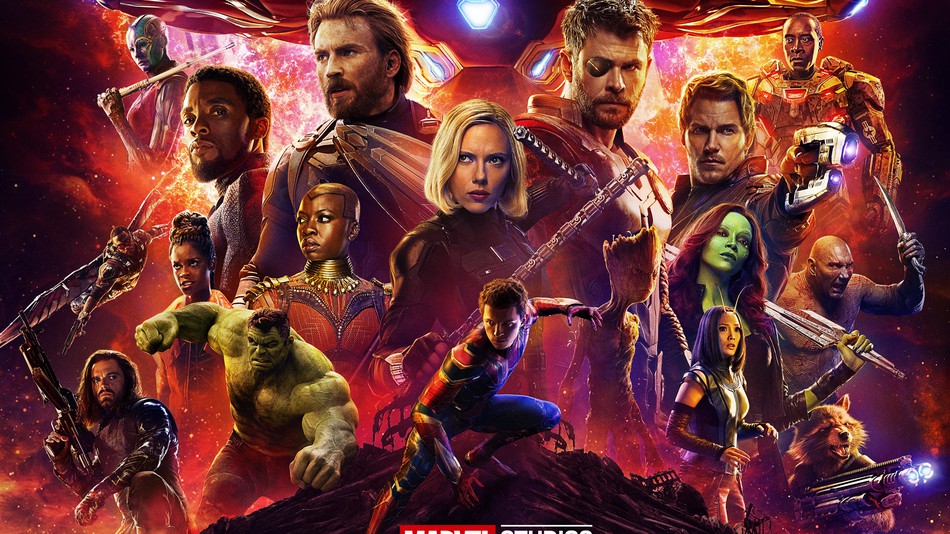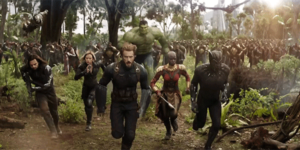
Avengers: Infinity War (2018)
Robert Downey Jr., Chris Hemsworth, Mark Ruffalo, Chris Evans, Scarlett Johansson, Benedict Cumberbatch, Don Cheadle, Tom Holland, Chadwick Boseman, Paul Bettany, Elizabeth Olsen, Anthony Mackie, Sebastian Stan, Danai Gurira, Letitia Wright, Dave Bautista, Zoe Saldana, Josh Brolin, Chris Pratt, Tom Hiddleston, Idris Elba, Peter Dinklage, Benedict Wong, Pom Lementieff, Karen Gillan, Vin Diesel, Bradley Cooper, Gwyneth Paltrow, Benicio Del Toro, Josh Brolin. Written by Christopher Markus and Stephen McFeely. Directed by Anthony Russo and Joe Russo.

However you may feel about comic book adaptations, there is something admirable about the concept and execution of films in the Marvel Cinematic Universe leading to Avengers: Inifinity War, and ostensibly concluding with its sequel in 2019. This is the nineteenth film in the series, with at least three to go in this cycle. Unlike other interminable series, which (with rare exception) at most plan ahead for two sequels, simply adding to the body with movie after movie according to the market’s demand, the MCU films have been driving toward this film seemingly since the beginning.
Whether the next Avengers movie is meant to be a conclusion or not, this one certainly feels like a pulling together of all the threads toward a final something. Although of course I assume that’s just part of the pattern for most long-running comic books.

Followers of the series are already aware of the Infinity Stones, MacGuffin devices containing unearthly power. Individually, they give their bearers amazing power. Combined, their power is insurmountable.
Thanos is determined to bring them together so that he might alleviate the universe of its greatest ills. Overpopulation has led to all troubles everywhere, so Thanos hopes arbitrarily to wipe out half the living beings, a terrible solution, but a last resort where one is needed. And since it is the only cure for what ails the universe, Thanos of course must let nothing or nobody get in his way.
The Avengers, the Guardians of the Galaxy, the citizens of Wakanda, Doctor Strange, and Spiderman try to get in his way.
 It’s a huge, far-flung plot involving a ridiculous number of important, charismatic characters with really only one villain, and it mostly works. It’s difficult to point to any one character and say, “That one didn’t get his or her fair share of screen time,” although at least three heroes are noticeably absent. I’m partial to Scarlet Witch and would have liked more of her, but everyone pretty much gets a nice, important part to play.
It’s a huge, far-flung plot involving a ridiculous number of important, charismatic characters with really only one villain, and it mostly works. It’s difficult to point to any one character and say, “That one didn’t get his or her fair share of screen time,” although at least three heroes are noticeably absent. I’m partial to Scarlet Witch and would have liked more of her, but everyone pretty much gets a nice, important part to play.
I really like the score, too.
I’ve heard criticism of the film’s pacing, but jumps in action from one set of heroes working on one part of the Infinity War to other sets of heroes working on their parts provide interesting scenery changes that pace the seemingly nonstop action rather well. It’s a fun, engaging, cool (wait ‘til you see Thor’s weapon) movie, and much better than the first two Avengers films.
78/100
7/10




 It’s September 30, 1975 in a small Texas town not far from where James Dean once filmed Giant, and it’s the twenty-year anniversary of Dean’s death in a car accident. The all-female James Dean fan club in this town reunites in the old Woolworth’s store where they used to meet. Some have been in regular contact, while others haven’t been seen in a very long time.
It’s September 30, 1975 in a small Texas town not far from where James Dean once filmed Giant, and it’s the twenty-year anniversary of Dean’s death in a car accident. The all-female James Dean fan club in this town reunites in the old Woolworth’s store where they used to meet. Some have been in regular contact, while others haven’t been seen in a very long time. The narrative switches between 1975 and 1955, with Altman using a mirror and some camera tricks to indicate the time segues. At first it’s a neat effect, but it becomes tiresome about midway through. The entire film does the same thing. What starts as a bunch of interesting characters and impressive acting becomes a your-turn-my-turn exchange of revelations and overwrought delivery that might have played well on stage but is exhausting on screen. After the first ninety minutes, I just wanted it to end already.
The narrative switches between 1975 and 1955, with Altman using a mirror and some camera tricks to indicate the time segues. At first it’s a neat effect, but it becomes tiresome about midway through. The entire film does the same thing. What starts as a bunch of interesting characters and impressive acting becomes a your-turn-my-turn exchange of revelations and overwrought delivery that might have played well on stage but is exhausting on screen. After the first ninety minutes, I just wanted it to end already. The Oakland Athletics beat the Baltimore Orioles Saturday, putting them one game over the .500 mark. I have a feeling that’s the way the season’s going to be. A few games over, a few games under, and hopefully a game or two over by season’s end. It’s a good team. It’s just not good enough, and I don’t think it’s for lack of talent. I think the team just needs to play together for a full season. The same guys next year, I think, will be a contending team.
The Oakland Athletics beat the Baltimore Orioles Saturday, putting them one game over the .500 mark. I have a feeling that’s the way the season’s going to be. A few games over, a few games under, and hopefully a game or two over by season’s end. It’s a good team. It’s just not good enough, and I don’t think it’s for lack of talent. I think the team just needs to play together for a full season. The same guys next year, I think, will be a contending team. Lava is fountaining out of the streets in a neighborhood in the southeast section of Hawaii island. This volcano has been erupting for 35 years, and it has wiped out entire communities, beloved landmarks, and historic buildings. But that’s been lava running down the slopes, creeping wherever it will, sometimes into the sea, sometimes over barren plains of hardened basalt, and sometimes right through neighborhoods.
Lava is fountaining out of the streets in a neighborhood in the southeast section of Hawaii island. This volcano has been erupting for 35 years, and it has wiped out entire communities, beloved landmarks, and historic buildings. But that’s been lava running down the slopes, creeping wherever it will, sometimes into the sea, sometimes over barren plains of hardened basalt, and sometimes right through neighborhoods. On a budget of three million dollars, A Nightmare on Elm Street 2: Freddy’s Revenge made just shy of thirty million dollars at the box office. While that’s far from blockbuster status, its investors probably didn’t complain about that kind of return, which explains the nine films in this series. They don’t have to be gigantic: they just have to be big enough.
On a budget of three million dollars, A Nightmare on Elm Street 2: Freddy’s Revenge made just shy of thirty million dollars at the box office. While that’s far from blockbuster status, its investors probably didn’t complain about that kind of return, which explains the nine films in this series. They don’t have to be gigantic: they just have to be big enough. Except for Robert Englund in the title role, none of the actors returns for this one, which is set in the same house in the same town. Five years after Nancy Thompson defeated Freddy Krueger, Jesse Walsh and his family move into the Thompsons’ old house. Jesse has nightmares of being stalked, of course, and he discovers the diary where Nancy recorded her dreams.
Except for Robert Englund in the title role, none of the actors returns for this one, which is set in the same house in the same town. Five years after Nancy Thompson defeated Freddy Krueger, Jesse Walsh and his family move into the Thompsons’ old house. Jesse has nightmares of being stalked, of course, and he discovers the diary where Nancy recorded her dreams. About midway through the movie’s eighty-five minutes, I was struck with a weird sense that this movie was more thoughtful than it needed to be. I expected something slightly less than its predecessor, since that was written by Wes Craven, a person whose name I know, while this was written by David Caskin, whom I had never heard of.
About midway through the movie’s eighty-five minutes, I was struck with a weird sense that this movie was more thoughtful than it needed to be. I expected something slightly less than its predecessor, since that was written by Wes Craven, a person whose name I know, while this was written by David Caskin, whom I had never heard of.




 I admired Destin Daniel Cretton’s Short Term 12, largely for its character-driven approach, realistic portrayal of life in a juvenile care home, and excellent acting by Brie Larson. Something about the director’s style appeals to me, and I’ve since become an even greater admirer of Larson, who won a Best Actress Oscar for her excellent performance in Room.
I admired Destin Daniel Cretton’s Short Term 12, largely for its character-driven approach, realistic portrayal of life in a juvenile care home, and excellent acting by Brie Larson. Something about the director’s style appeals to me, and I’ve since become an even greater admirer of Larson, who won a Best Actress Oscar for her excellent performance in Room. More than anything, Rex Walls (Woody Harrelson) cherishes his freedom. While he’s more than capable of earning an honest living, he and his wife Rose Mary (Naomi Watts) love being able to get into a car and go anywhere, whenever they want, and set up temporary homes wherever they can find some space. Sure, these moves are often spurred by mounting debts the family has no hope of repaying, but they do a good job of communicating to their kids that as long as they have the stars at night, each other all the time, and freedom from obligations, they’re pretty wealthy.
More than anything, Rex Walls (Woody Harrelson) cherishes his freedom. While he’s more than capable of earning an honest living, he and his wife Rose Mary (Naomi Watts) love being able to get into a car and go anywhere, whenever they want, and set up temporary homes wherever they can find some space. Sure, these moves are often spurred by mounting debts the family has no hope of repaying, but they do a good job of communicating to their kids that as long as they have the stars at night, each other all the time, and freedom from obligations, they’re pretty wealthy. This is really the story of how Jeannette—clearly her father’s favorite, at least as this story is told—grows through stages of relating to and understanding her father. I find it a satisfying arc, although whether you will find it satisfying probably depends on how strongly you condemn Rex. Many critics seem to believe that Rex’s offenses are too great for any kind of redemption, let alone the weakly granted redemption he’s given. Since the film is told through Jeannette’s eyes, I say there’s a place where maybe we don’t feel at all satisfied for Jeannette and her siblings but can accept that they’re satisfied themselves. This is their father, and what good will it do any of them not to forgive?
This is really the story of how Jeannette—clearly her father’s favorite, at least as this story is told—grows through stages of relating to and understanding her father. I find it a satisfying arc, although whether you will find it satisfying probably depends on how strongly you condemn Rex. Many critics seem to believe that Rex’s offenses are too great for any kind of redemption, let alone the weakly granted redemption he’s given. Since the film is told through Jeannette’s eyes, I say there’s a place where maybe we don’t feel at all satisfied for Jeannette and her siblings but can accept that they’re satisfied themselves. This is their father, and what good will it do any of them not to forgive? Nim is an eleven-year-old girl living alone with her father on a tiny, remote island in the Pacific. Her father Jack is a marine biologist searching for a new species of protozoa. Jack’s boat is hit by a huge storm while on a short expedition, and Nim is left to wonder what’s happened to him. With help from her pets on the island (a bearded dragon and a sea lion), she fends off an Australian tour company looking to turn her island into a resort, but when things get rough, she reaches out to her favorite author, an adventurer named Alex Rover, for help.
Nim is an eleven-year-old girl living alone with her father on a tiny, remote island in the Pacific. Her father Jack is a marine biologist searching for a new species of protozoa. Jack’s boat is hit by a huge storm while on a short expedition, and Nim is left to wonder what’s happened to him. With help from her pets on the island (a bearded dragon and a sea lion), she fends off an Australian tour company looking to turn her island into a resort, but when things get rough, she reaches out to her favorite author, an adventurer named Alex Rover, for help. This kids movie is too cutesy by about half, but this can be forgiven because of the filmmakers’ creativity and conscience in telling an interesting story about a tweener who’s neither a helpless baby nor a grownup in a kid’s body. Yes, she’s smart because she has been raised by a smart father, and yes she’s tough because she’s lived her whole life doing things for herself. But she’s also scared, not because she can’t take care of herself, but because where the heck is her father?
This kids movie is too cutesy by about half, but this can be forgiven because of the filmmakers’ creativity and conscience in telling an interesting story about a tweener who’s neither a helpless baby nor a grownup in a kid’s body. Yes, she’s smart because she has been raised by a smart father, and yes she’s tough because she’s lived her whole life doing things for herself. But she’s also scared, not because she can’t take care of herself, but because where the heck is her father? Where it falls short for me are where Levin and Flackett go to moviemaking shorthand in places where it’s senseless and unnecessary. I’m no vulcanologist, but I suspect the volcano on Nim’s island behaves in a decidely unrealistic way, which perhaps I wouldn’t mind so much if it weren’t a movie about a girl whose parents are scientists. And there is a scene at what is supposed to be the airport on Rarotonga that is straight out of movies from a less enlightened time, including chickens in bamboo cages and a gate attendant with a heavy Asian accent.
Where it falls short for me are where Levin and Flackett go to moviemaking shorthand in places where it’s senseless and unnecessary. I’m no vulcanologist, but I suspect the volcano on Nim’s island behaves in a decidely unrealistic way, which perhaps I wouldn’t mind so much if it weren’t a movie about a girl whose parents are scientists. And there is a scene at what is supposed to be the airport on Rarotonga that is straight out of movies from a less enlightened time, including chickens in bamboo cages and a gate attendant with a heavy Asian accent. One neat trick the directors employ is to let us see what the world looks and feels like to Alexandra, then to show us what it’s like to everyone else. Why not frame the silly exaggerated primitiveness of the Rarotonga airport as Alexandra’s perception, then show us what it really looks like?
One neat trick the directors employ is to let us see what the world looks and feels like to Alexandra, then to show us what it’s like to everyone else. Why not frame the silly exaggerated primitiveness of the Rarotonga airport as Alexandra’s perception, then show us what it really looks like? They took some vitals. I was fine, cold-wise, but my BP was off the chart. We’re talking in the 210s. The doctor asked me a bunch of questions. Do I drink? Yes, but not more than a couple of beers per week; usually a couple of beers every other week. Do I exercise? Yes, but not very strenuously. I walk about 40 miles per week (81,500 steps per week back then). History of high BP in my family? Yes. But no history myself. I’ve never hit numbers above normal.
They took some vitals. I was fine, cold-wise, but my BP was off the chart. We’re talking in the 210s. The doctor asked me a bunch of questions. Do I drink? Yes, but not more than a couple of beers per week; usually a couple of beers every other week. Do I exercise? Yes, but not very strenuously. I walk about 40 miles per week (81,500 steps per week back then). History of high BP in my family? Yes. But no history myself. I’ve never hit numbers above normal. How well do you sleep? my doctor asked. I’ve had sleep issues all my life. How many hours do you usually get? Um. Five and a half to six? Why so few? Because I’m immature and irresponsible. Do you snore? Like a madman, although that wasn’t always the case. Do you wake up gasping for air? Yes, pretty often. Do you wake up with headaches? Frequently.
How well do you sleep? my doctor asked. I’ve had sleep issues all my life. How many hours do you usually get? Um. Five and a half to six? Why so few? Because I’m immature and irresponsible. Do you snore? Like a madman, although that wasn’t always the case. Do you wake up gasping for air? Yes, pretty often. Do you wake up with headaches? Frequently. A few days later, I had a machine, a small thing you plug into the wall, about the size and shape of a loaf of pumpernickel. Connecting the device to a mask covering my face and mouth, a long plastic tube. There’s a reservoir for water, so the air going into my lungs is humid enough not to dry me out.
A few days later, I had a machine, a small thing you plug into the wall, about the size and shape of a loaf of pumpernickel. Connecting the device to a mask covering my face and mouth, a long plastic tube. There’s a reservoir for water, so the air going into my lungs is humid enough not to dry me out.